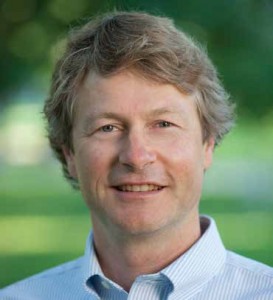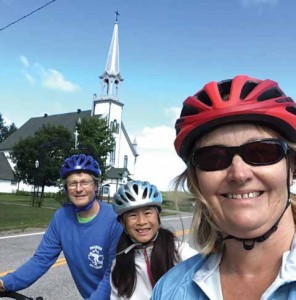Tanis Browning-Shelp
One year ago, The Mainstreeter interviewed former Capital Ward City Councillor David Chernushenko during the final leg of his electric car cross-Canada book tour, his hatchback emptied of his climate change thriller, Burning Souls. To date, he has sold 1,000 copies of the book and signed an option with a Quebec production company to turn it into a TV mini-series. On the anniversary of the tour, and with us now in the midst of a global pandemic, we contacted Chernushenko to get his perspective for Be the Change.

Chernushenko: People in our communities are now embracing environmental change and sacrifice together. Photo by Andrew Balfour
THE MAINSTREETER: David, you turned to fiction as a way of reaching people about the need for environmental change. Do you have examples of how you made an impact with Burning Souls?
CHERNUSHENKO: Readers have told me that the book shook them up. Some described it as a “grab you by the lapels” or “smack you in the forehead” read and others remarked that they already see the book’s climate and social changes taking place in real life.
One reader said they finally felt the threat of climate change through reading the novel, something they’d been able to avoid until then. Another, who normally prefers reading non-fiction, was impressed with the news and information in the book and my perspective on human behaviour. They’ve since become better informed and more involved in the issues facing our planet, and now engage people in meaningful conversations about them.
A woman from Nelson, BC told me that about a third of the way through the novel she realized she was always thinking about it. And that while Burning Souls paints a believable (and grim) picture of the near future, she sees that there is hope, as embodied in the main characters, who represent a kind of idealized global community of shared values. When I do book events, I often feel like I’m leading ecological grief sessions rather than literary discussions. We’re all going through this together and we can get support from one another.
THE MAINSTREETER: Do you believe that the pandemic has made an impact on people in terms of how they look at climate change?
CHERNUSHENKO: Yes, the pandemic is causing us to question what we did before. Some people want to get back to ‘normal’ as soon as possible. But time has also given us the chance to ask questions like: Did I really enjoy driving all across the city shuttling my kids to soccer etc. and spending so much time in the car?
Some people can’t wait to get back to the office to be surrounded by peers and not family members. But others think it’s great working from home.
Early on, people noticed environmental changes like the improved air quality over China, the Venice canal looking clearer, reduced commuter traffic, and kids playing in the streets. Cities were turning streets over to walkers and bikers and people were saying things like: “I’m never flying again,” or “I’m never going on another business trip.”
But will these changes be long-term, or merely short-term? We’re not making nearly enough changes to get us to the 80 percent CO2 reductions (by 2050) recommended by the Paris Treaty.
The upside is that, wow, if the government can make new rules to protect us from a deadly virus, then why not for climate change? People hated wearing masks, staying at home, etc., but they still did it. And the government found money to make major change happen.
The downside is that all over the world governments are fast-tracking major projects using COVID-19 as an excuse not to do proper environmental assessments. In Ontario, we’ve weakened our environmental laws. This is happening on a global scale with illegal cutting and burning in the Amazon and in Eastern Europe because inspectors aren’t out doing their jobs.
People may be riding their bikes in Paris, and the smog may have lifted for now, but the big picture is not as rosy. We’re doing more in cars because of fear of the disease. And people are scared of public transit. There’s been more speeding and stunt driving.
We’re also seeing connections between COVID-19, air pollution, and both race and poverty. Early results show that susceptibility to the virus is much greater in areas where air pollution is high because of poorer lung and overall health. Since this is more often in regions or neighbourhoods where people of lower income and people of colour live, there is a social and economic connection. Polluting industries tend to be concentrated more in places where those with less of a political voice live. It is grossly unfair and unjust that we in affluent places should be spared the worst of COVID-19 relative to those in places from which we continue to source manufactured products and resources. We need to work to reduce pollution and improve air quality in all places.
And we need to make sure the changes we’ve implemented during the pandemic become permanent. Flying for academia, for example. We found out that we don’t need to go to London, Rome, and Tokyo. We can save time and money this way. This can lead to policy changes within governments, universities, and businesses.
THE MAINSTREETER: Can we improve our community because of the pandemic to make it more sustainable and healthier?
CHERNUSHENKO: It’s been such a treat to have some roads open for cycling. I see thousands of people out on their bikes, scooters, rollerblading, walking, and running. We’ve found out that these outdoor physical activities are the least risky for transmitting COVID-19. With the push to intensification, our inner-city and suburban paths are packed. People are starting to think they have to go out to the country. But intensification still makes sense. We need to provide more space for people to do these things in our communities. Hey, city builders, design for that!
I’ve also seen a surge in gardening. There’s nothing like the threat of death to make you celebrate and encourage life. I’ve seen more planter boxes filled than ever before.
Also, people have been cooking from scratch, which is healthier, and spending more time with their kids and partners.
People in our communities are starting to see that social and environmental changes do need to be made! We’ve heard for years that travel, car use, and air conditioner use need to decrease. But nobody wanted to be the first to give stuff up. People think: “If I’m sacrificing, then I want to know that everybody else is sacrificing!” The pandemic, in a way, has been the great equalizer. People in our communities are now embracing environmental change and sacrifice together. We’re discovering the fun in stuff like growing and cooking our own food and going on bike rides. We’ve discovered that, hey, we can do this! Going forward, let’s remember we did that.







